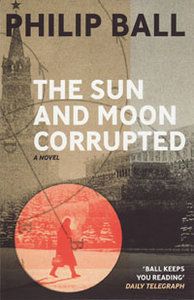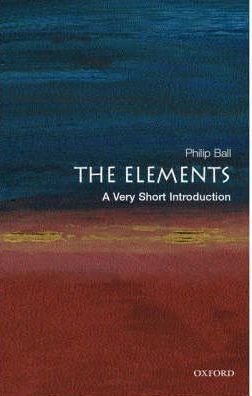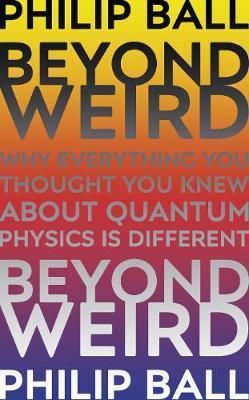Philip Ball
autor
Sun And Moon Corrupted
What if you had developed a machine that generated energy for free and no-one believed you? That is the lot of Kurt Neder, once Einstein's accomplice and the brightest young physicist of his generation, now a lost soul wandering Europe in the hope that someone will pay him heed. Enter Lena - an intrepid young British journalist, hoping for a story to kick-start her stalled career, and driven by her own needs and beliefs, and her own need to believe. Her trail takes her from the cafes of Vienna via the castles of Transylvania and the labs of Princeton to the blasted borderlands of the old Soviet Union, in the search for truth and coherence, both scientific and personal. Here is a Geiger-counter of a novel that crackles with ideas and offers the reader insights and emotions not often found in fiction.
Vypredané
11,35 €
11,95 €
Ďáblův doktor
Theophrastus Bombastus von Hohenheim (1493-1541), známý jako Paracelsus, žil a působil na hranici mezi středověkem a moderní dobou. Byl současníkem Lutherovým a nepřítelem tradičního lékařství, postrachem univerzit ("na všech německých školách se nelze naučit více než na trhu ve Frankfurtu"), vojenským ranhojičem a alchymistou. Mýty o něm - počínaje jeho léčením ze záhrobí v Salcburku 19. století až po jeho faustovský obchod s ďáblem s cílem nabýt ztracené mládí - přetrvaly mnohem déle než jeho skutečný příběh.
Vypredané
20,77 €
21,86 €
Molecules: A Very Short Introduction (Very Short Introductions)
The processes in a single living cell are akin to that of a city teeming with molecular inhabitants that move, communicate, cooperate, and compete. In this Very Short Introduction, Philip Ball explores the role of the molecule in and around us - how, for example, a single fertilized egg can grow into a multi-celled Mozart, what makes spider's silk insoluble in the morning dew, and how this molecular dynamism is being captured in the laboratory, promising to reinvent chemistry as the central creative science of the century.
The Elements: A Very Short Introduction (Very Short Introductions)
This Very Short Introduction traces the history and cultural impact of the elements on humankind, and examines why people have long sought to identify the substances around them. Looking beyond the Periodic Table, the author examines our relationship with matter, from the uncomplicated vision of the Greek philosophers, who believed there were four elements - earth, air, fire, and water - to the work of modern-day scientists in creating elements such as hassium and meitnerium. Packed with anecdotes, The Elements is a highly engaging and entertaining exploration of the fundamental question: what is the world made from?
Vypredané
11,09 €
11,67 €
The Water Kingdom
Selected as a Book of the Year by The Times and The Economist China's history is an epic tapestry of courtly philosophies, warring factions and imperial intrigue. Yet, over five thousand years, one ancient element has so dramatically shaped the country's fate that it remains the key to unlocking China's story. That element is water. In The Water Kingdom Philip Ball takes us on a grand tour of China's defining element, from the rice terraces and towering karts of its battle-worn waterways, to the vast engineering projects that have struggled to contain water's wrath. What surfaces is the secret history of a people and a nation, drawn from its deep reverence for nature's most dynamic force.
Vypredané
12,30 €
12,95 €
Serving the Reich
Serving the Reich tells the story of physics under Hitler. While some scientists tried to create an Aryan physics that excluded any 'Jewish ideas', many others made compromises and concessions as they continued to work under the Nazi regime. Among them were three world-renowned physicists: Max Planck, pioneer of quantum theory, regarded it as his moral duty to carry on under the regime. Peter Debye, a Dutch physicist, rose to run the Reich's most important research institute before leaving for the United States in 1940. Werner Heisenberg, discovered the Uncertainty Principle, and became the leading figure in Germany's race for the atomic bomb. After the war most scientists in Germany maintained they had been apolitical or even resisted the regime: Debye claimed that he had gone to America to escape Nazi interference in his research; Heisenberg and others argued that they had deliberately delayed production of the atomic bomb. Mixing history, science and biography, Serving the Reich is a gripping exploration of moral choices under a totalitarian regime. Here are human dilemmas, failures to take responsibility, three lives caught between the idealistic goals of science and a tyrannical ideology.
Vypredané
11,88 €
12,50 €
Beyond Weird
This is the book I wish I could have written but am very glad I've read' Jim Al-Khalili
`I think I can safely say that nobody understands quantum mechanics.'
Richard Feynman wrote this in 1965 - the year he was awarded the Nobel prize in physics for his work on quantum mechanics.
Quantum physics is regarded as one of the most obscure and impenetrable subjects in all of science. But when Feynman said he didn't understand quantum mechanics, he didn't mean that he couldn't do it - he meant that's all he could do. He didn't understand what the maths was saying: what quantum mechanics tells us about reality.
Over the past decade or so, the enigma of quantum mechanics has come into sharper focus. We now realise that quantum mechanics is less about particles and waves, uncertainty and fuzziness, than a theory about information: about what can be known and how.
This is more disturbing than our bad habit of describing the quantum world as `things behaving weirdly' suggests. It calls into question the meanings and limits of space and time, cause and effect, and knowledge itself.
The quantum world isn't a different world: it is our world, and if anything deserves to be called `weird', it's us. This exhilarating book is about what quantum maths really means - and what it doesn't mean.
Vypredané
14,73 €
15,50 €
Elements
This book offers a largely chronological illustrated guide to how the chemical elements were discovered over the past three millennia. It provides a view not just of how we came to understand what everything is made of but also of how chemistry developed from a trial-and-error craft of making and transforming substances into a rational modern science that provides us with new materials, drugs, and much else.
While other books have described the properties of the chemical elements and often delved into their histories, none has done so in this highly visual manner. The closest comparison is Theodore Gray's illustrated book The Elements - but this does not take a historical approach as this does here. The pictorial material for this subject is very rich, including some gorgeous alchemical documents as well as portraits, colour charts, woodcuts of mining, artefacts such as John Dalton's wooden balls, advertisements (for example, for radium 'cures') and postage stamps.
The book contains separate short sections for each element or groups of related elements, which are gathered into several sections to order the sequence into several chronological eras of element discovery. Included are short 'interludes' (or 'feature spreads') presenting important intellectual milestones in how we think about elements.
With 192 illustrations
Vypredané
29,93 €
31,50 €
The Book of Minds
Understanding the human mind and how it relates to the world of experience has challenged scientists and philosophers for centuries. How do we even begin to think about 'minds' that are not human? That is the question explored in this ground-breaking book. Award-winning science writer Philip Ball argues that in order to understand our own minds and imagine those of others, we need to move on from considering the human mind as a standard against which all others should be measured.
Science has begun to have something to say about the properties of mind; the more we learn about the minds of other creatures, from octopuses to chimpanzees, to imagine the potential minds of computers and alien intelligences, the more we can begin to see our own, and the more we can understand the diversity of the human mind, in the widest of contexts. By understanding how minds differ, we can also best understand our own.
Vypredané
20,85 €
21,95 €
Lacná kniha Ďáblův doktor (-50%)
Theophrastus Bombastus von Hohenheim (1493-1541), známý jako Paracelsus, žil a působil na hranici mezi středověkem a moderní dobou. Byl současníkem Lutherovým a nepřítelem tradičního lékařství, postrachem univerzit ("na všech německých školách se nelze naučit více než na trhu ve Frankfurtu"), vojenským ranhojičem a alchymistou. Mýty o něm - počínaje jeho léčením ze záhrobí v Salcburku 19. století až po jeho faustovský obchod s ďáblem s cílem nabýt ztracené mládí - přetrvaly mnohem déle než jeho skutečný příběh.
Vypredané
10,93 €
21,86 €
dostupné aj ako:
The Book of Minds
Understanding the human mind and how it relates to the world that we experience has challenged philosophers for centuries. How then do we even begin to think about ‘minds’ that are not human?
Science now has plenty to say about the properties of mind. In recent decades, the mind – both human and otherwise – has been explored by scientists in fields ranging from zoology to astrobiology, computer science to neuroscience. Taking a uniquely broad view of minds and where they might be found – including in plants, aliens, and God – Philip Ball pulls these multidisciplinary pieces together to explore what sorts of minds we might expect to find in the universe. In so doing, he offers for the first time a unified way of thinking about what minds are and what they can do, arguing that in order to understand our own minds and imagine those of others, we need to move on from considering the human mind as a standard against which all others should be measured, and to think about the ‘space of possible minds’.
By identifying and mapping out properties of mind without prioritizing the human, Ball sheds new light on a host of fascinating questions. What moral rights should we afford animals, and can we understand their thoughts? Should we worry that AI is going to take over society? If there are intelligent aliens out there, how could we communicate with them? Should we? Understanding the space of possible minds also reveals ways of making advances in understanding some of the most challenging questions in contemporary science: What is thought? What is consciousness? And what (if anything) is free will?
The more we learn about the minds of other creatures, from octopuses to chimpanzees, and to imagine the potential minds of computers and alien intelligences, the greater the perspective we have on if and how our own is different. Ball’s thrillingly ambitious The Book of Minds about the nature and existence of minds is more mind-expanding than we could imagine. In this fascinating panorama of other minds, we come to better know our own.
Vypredané
16,10 €
16,95 €
How Life Works
A cutting-edge new vision of biology that will revise our concept of what life itself is, how to enhance it, and what possibilities it offers – from Science Book Prize winner and former Nature editor Philip Ball.
Biology is undergoing a quiet but profound transformation. Several aspects of the standard picture of how life works have been exposed as incomplete, misleading, or wrong.
In How Life Works, Philip Ball explores the new biology, revealing life to be a far richer, more ingenious affair than we had guessed. With this knowledge come new possibilities. Today we can redesign and reconfigure living systems, tissues, and organisms. We can reprogram cells, for instance, to carry out new tasks and grow into structures not seen in the natural world. Some researchers believe that ultimately we will be able to regenerate limbs and organs, and perhaps even create new life forms that evolution has never imagined.
Incorporating the latest research and insights, How Life Works is a sweeping journey into this new frontier of the nature of life, a realm that will reshape our understanding of life as we know it.
Vypredané
20,85 €
21,95 €















